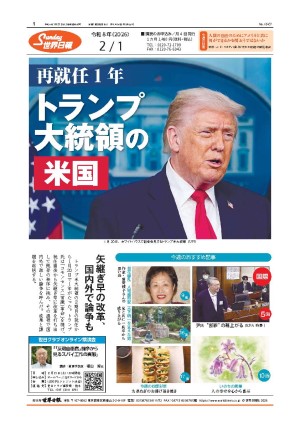A challenge to Congress 連邦議会への申し入れ
A challenge to Congress
When Richard Nixon signed the legislation establishing the Environmental Protection Agency in 1970, he was praised for his vision and commitment to conservation “going forward,” though that cliche had yet to be coined. A few critics – “outliers,” in another cliche waiting to be born – warned that the EPA could grow into a nightmare of a bureaucracy, but no one paid attention. Jeremiahs are rarely popular at the picnic.
Forty years on, and the EPA is an agency out of control, listening neither to Congress nor the courts, determined to substitute whim, caprice and vagary for common sense, imposing on one and all in the name of the greater good.
Its latest crusade is another attempt to regulate the emission of carbon dioxide – the stuff we all breathe and necessary for the life of plants – this time in the generation of electric power.
Under a rule designed to change the behavior of existing power plants, something called the Clean Power Plan employs an obscure and rarely used section of the federal Clean Air Act to “encourage” states to regulate the production, transmission, and consumption of electricity. The objective is to set and meet numerical targets for carbon-dioxide emissions, bringing emissions down 30 percent by 2030 to forestall further damage to the economy from “global climate change,” the phenomenon called “global warming” before the natural global warming cycle ended two decades ago. Everyone can agree that the climate changes: sometimes it rains, and sometimes it doesn’t.
This scheme to control the production of electric power works, says its advocates, because it’s grounded in the principles of federalism, that the participation of the individual states is voluntary. But “voluntary” only in the way that turning over your wallet, your watch and your car keys to the thug holding a gun at your head is voluntary. You don’t have to turn it over if you’re willing to take a bullet.
The loaded gun the EPA points at the states is the threat, which is without precedent, to shut down the electricity generating capacity of states that refuse to join the combine. “Once again, we see a Washington power grab of a highly complex and critical sector of the economy that affects every American consumer without thinking through all of the consequences,” says Rep. Fred Upton of Michigan, the Republican chairman of the House Committee on Energy and Commerce. It’s like Obamacare, deja vu all over again.
The implementation of the rule has been delayed, in the way Obamacare had to go briefly back to the drawing board, so that the EPA can work with the states to “help” them develop compliance plans and work out the agency’s strategy for combating challenges in Congress and the courts. This proposal is costly, unnecessary and will inevitably drive up the cost of electricity for the consumer. It’s likely to reduce the reliability of electric power as well. “Pay more for less” doesn’t work. If the new Congress, which came to Washington with immense bravado and lots of brave talk, wants to transform some of the big talk to action, this is a place to do it.
March 31, 2015
連邦議会への申し入れ
リチャード・ニクソンが1970年に「環境保護庁」(EPA)設立の法律制定に署名した時、彼は彼のビジョンと環境保護「前進」に対する熱意を称賛された。もっとも、その表現は、定着しなかった。若干の批評家――生まれるのを待っている別の表現で言うと「アウトライヤー(外れもの)」――は、EPAは、役所仕事の悪夢になっていく可能性がある、と警告したが、注意を払う者はいなかった。ピクニックに(へブライの預言者)エレミヤが現れるのはめったに歓迎されるものではない。
40年たって、EPAは、連邦議会の言うことも、裁判所の言うことも聞かず、断固として、良識の代わりに、突然の思い付き、気まぐれ、予測不能の変更をやってのけて、みんなに大善の名の下に押し付けたりするなど、抑制の利かない機関になっている。
その最新の改革運動は、私たち皆が呼吸しており、植物の命に必要な物、すなわち、二酸化炭素の排出を規制する試みがあるが、それに新たに加えて、今回は、電気エネルギーの生産を規制しようとしているのである。
現存の発電所の行動様式を変えるために作られた規則の下に、「クリーン・エネルギー計画」と呼ばれるものが、意味のはっきりしない連邦「クリーン・エア法(大気汚染防止法)」というめったに利用されることのない条項を使って、諸州に、発電、送電、そして電力の消費の規制を「奨励」しようとしているのである。その目的は、二酸化炭素排出の数値目標を設定し、それに合わせることである。「グローバルな気候変動」による経済へのさらなるダメージを未然に防止するために2030年までに排出量を30%引き下げようというのである。グローバルな気候変動は、自然のグローバルな温暖化の周期が20年前に終わる前にそのように呼ばれた現象である。気候は、時には雨が降り、時には降らなかったりというように、変化するということに異論を唱えるものは誰もいない。
電力の生産を規制しようというこの計画は、その提唱者によると、有効だという。なぜならば、それは、個々の州の参加は自由意思によるという連邦主義の原則に基づいているからだという訳だ。しかし、「自由意思」と言っても、頭に銃を突き付けている悪党に、財布や、時計や、車の鍵を渡すというような場合の「自由意思」でしかない。あなたが、喜んで銃弾を受けるつもりならば、そういった物を渡す必要がない、ということなのだ。
EPAが諸州に向けた弾が込められた銃は、前例はないが、この連合に加わることを拒否する州の発電能力を止めるぞという脅しである。「またもや、あらゆる結果をとことん考えることなく、米国の消費者全員に影響の及ぶ、高度に複雑で重要な経済部門に対するワシントンの権力掌握を目の当たりにする」と、下院エネルギー商業委員会委員長、フレッド・アプトン議員(ミシガン選出、共和)は言う。まるでオバマケア(オバマ政権による医療保険改革)と同じで、またまた、既視感(デジャブ)を覚える。
このルールの施行は、オバマケアが一時的に振り出しに戻らざるを得なかったように、遅れている。その結果、EPAは、諸州が順守計画を進める「手助け」をするために協力し、議会や法廷での異議申し立てと戦うEPAの戦略を編み出すことができるのである。提案は高くつき、不必要で、消費者の電気料金を引き上げることは必至である。それは、また、電力に対する信頼も下げる可能性がある。「より少ないものをもらってより高い金を払う」のでは有効ではない。ワシントンに大手を振って、そして大層な空威張りでやってきた新しい連邦議会は、大言壮語の一部でも行動に移したいと願うなら、ここが正念場である。
(3月31日付)





